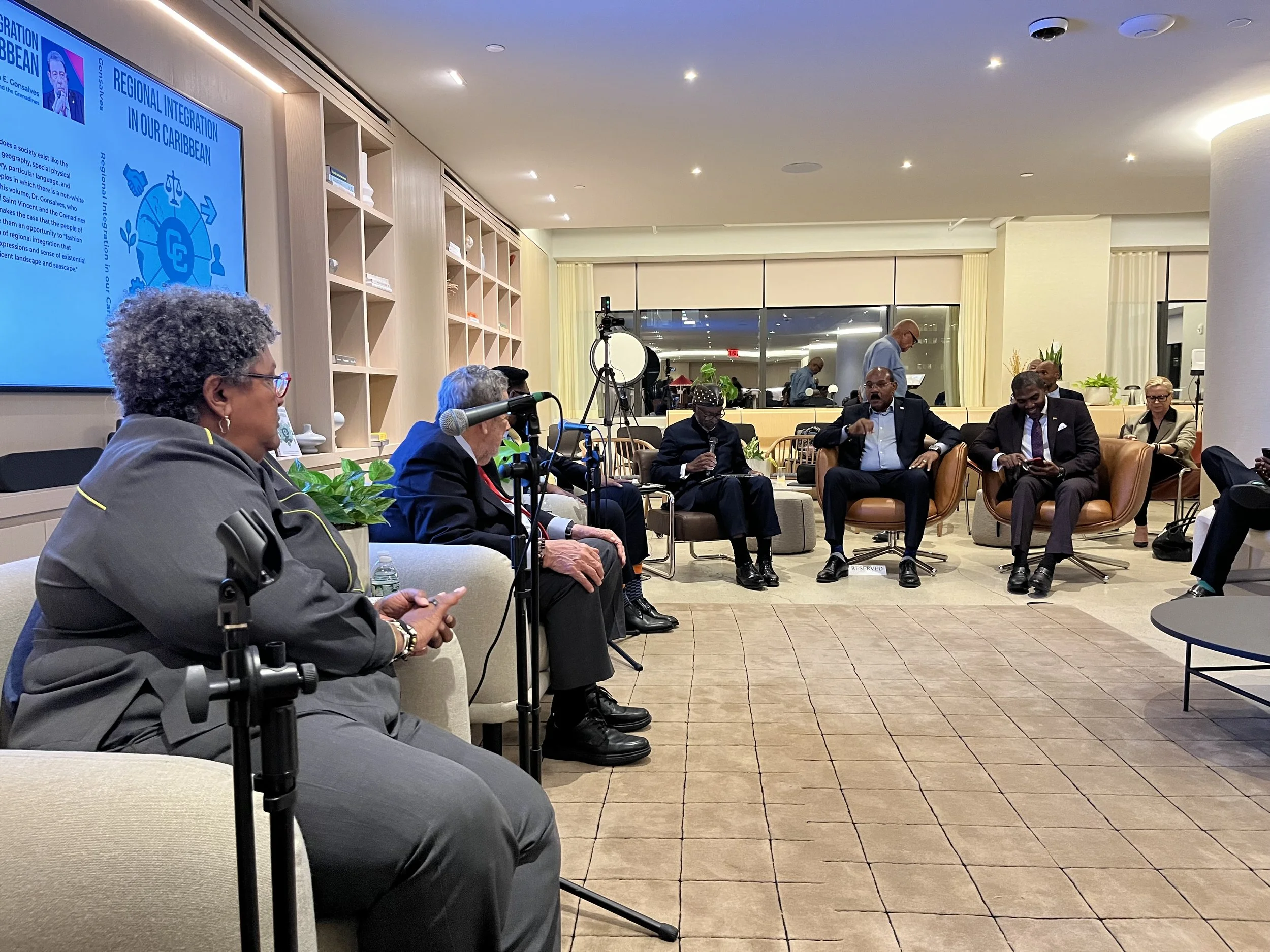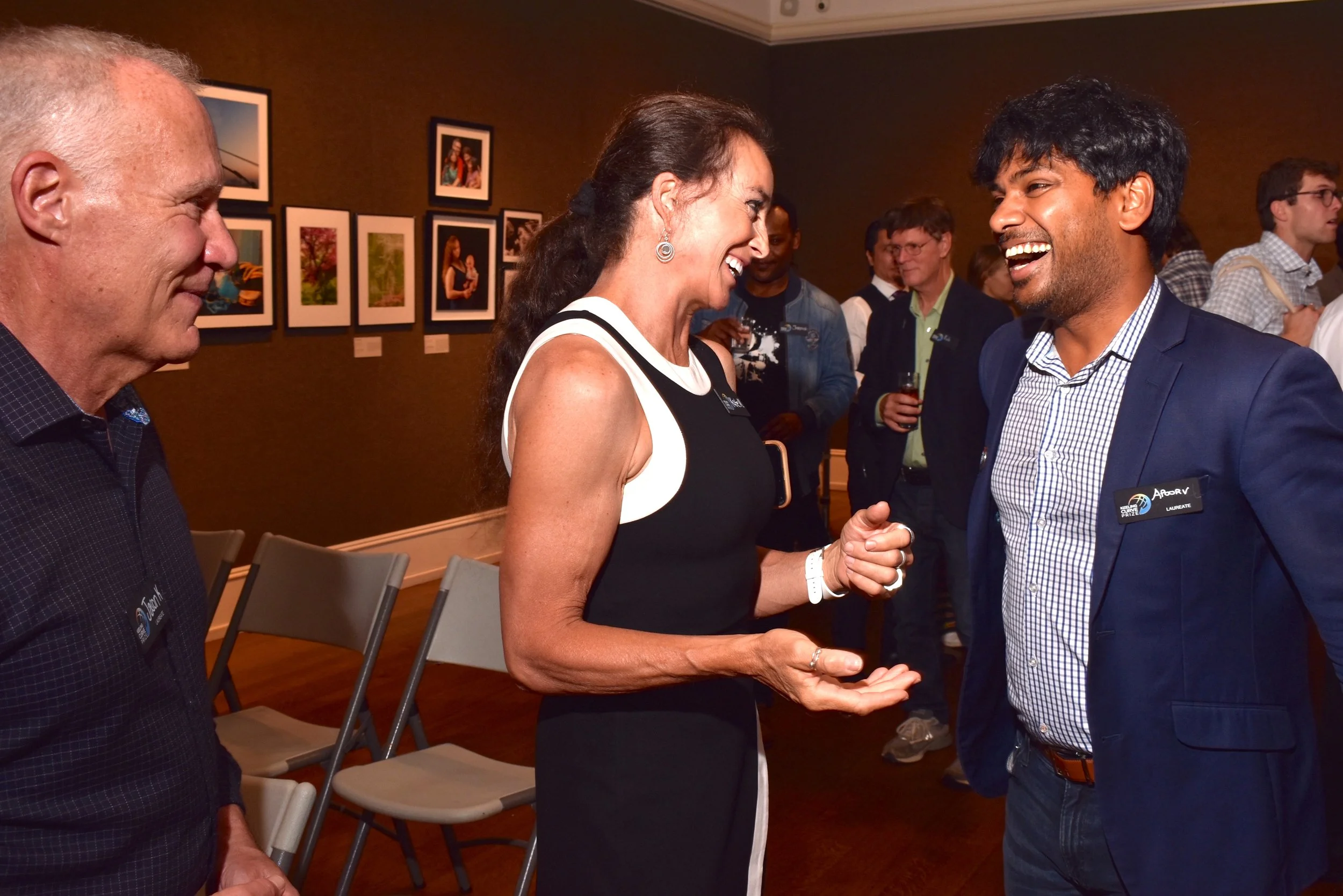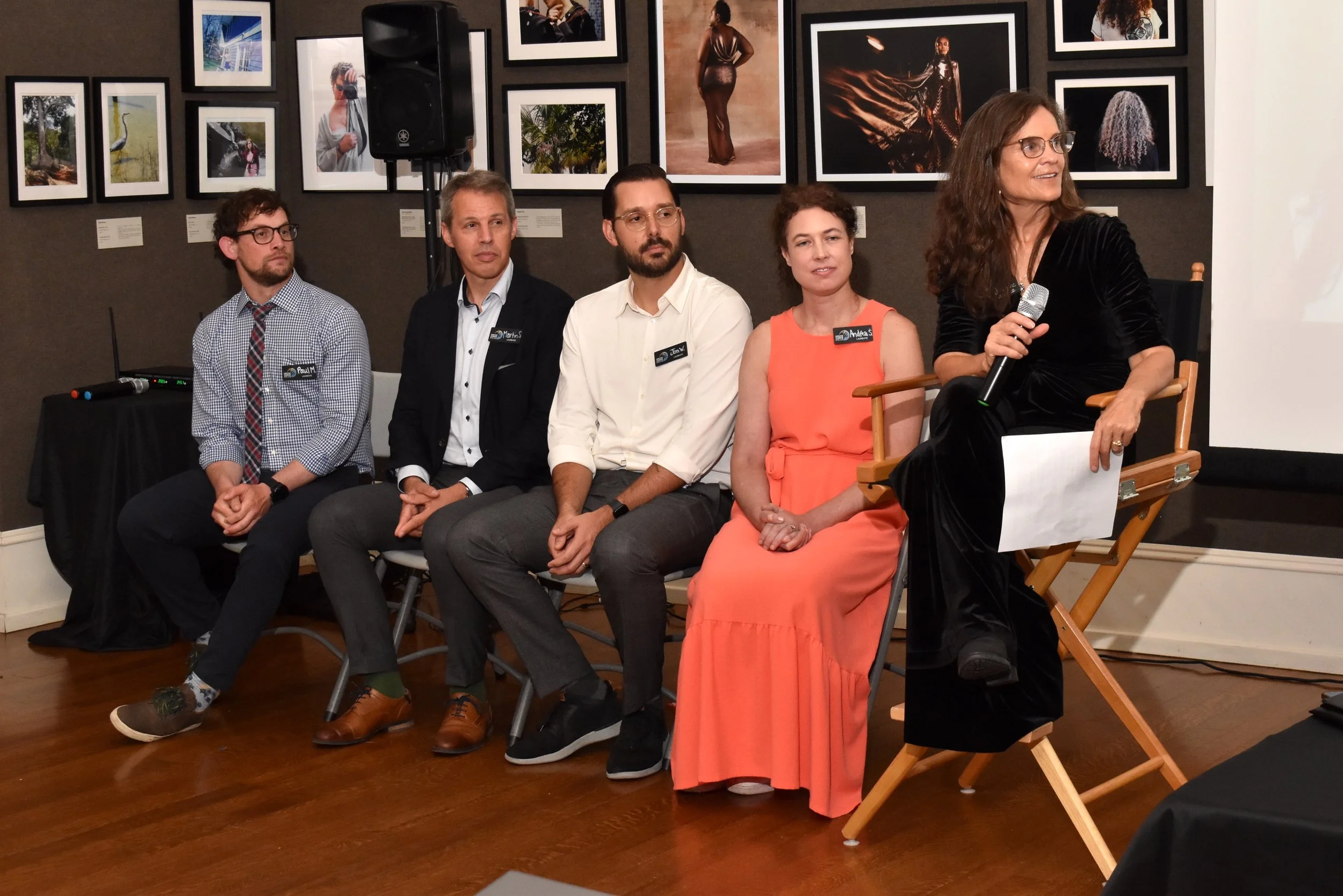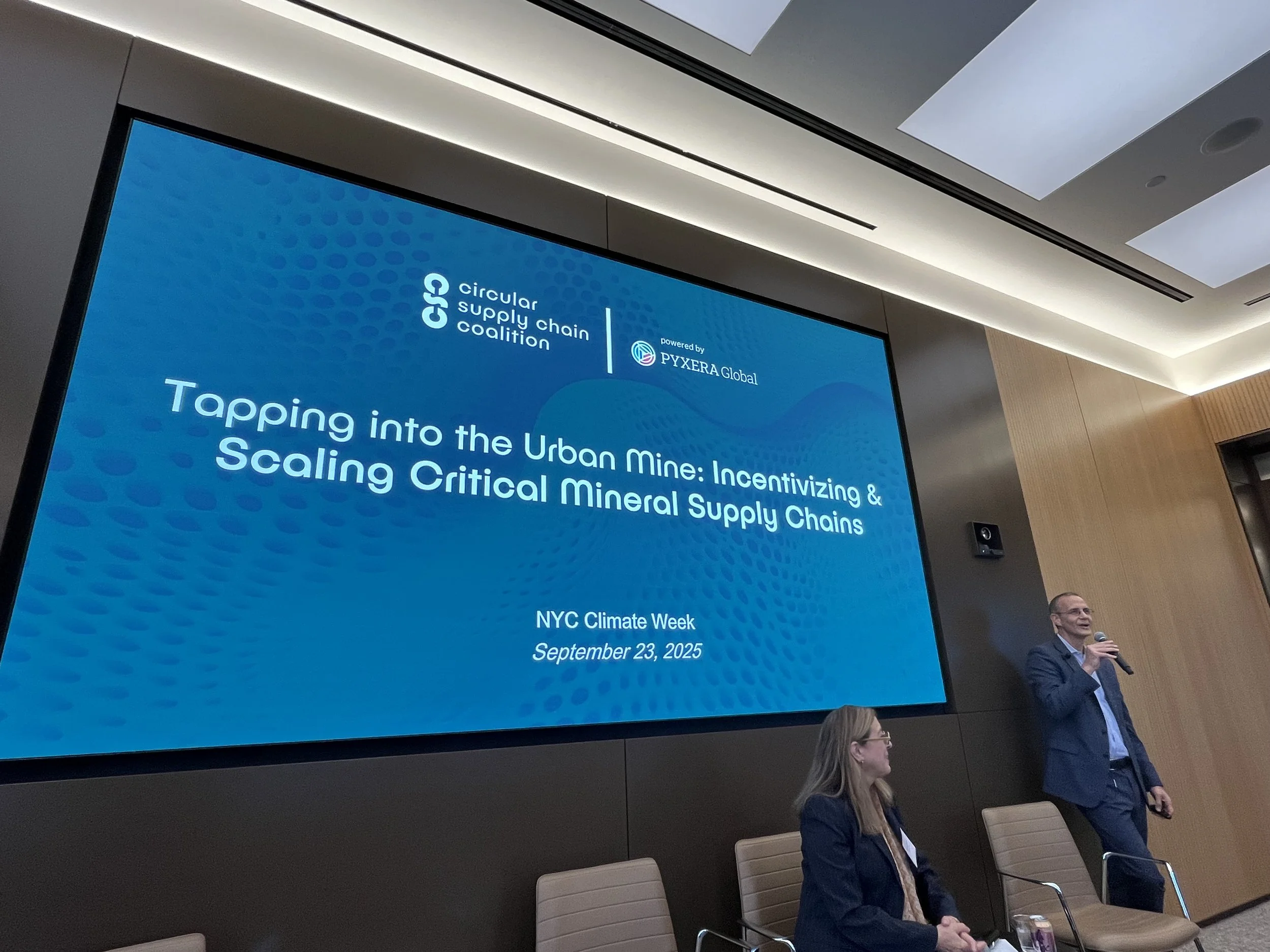A Week of Hope
From left, Barbados Prime Minister Mia Amor Mottley; St. Vincent and the Grenadines Prime Minister Ralph Gonsalves; Guyana President Mohamed Irfaan Ali; panel co-moderator Dr. Fadhilika Atiba-Weza; Antigua and Barbuda Prime Minister Gaston Browne; and St. Kitts and Nevis Prime Minister Terrance Drew
There’s enough doom-and-gloom news in the environment and climate space to sink all but the most indomitable of spirits. Luckily, there are so many unsinkable optimists and activists, scientists and journalists, naturalists and philanthropists who are ignoring the corruption, incompetence, and existentially dangerous positions emanating from Pennsylvania Avenue in D.C. and who convened last month during Climate Week NYC (CWNYC).
CWNYC — which is staged annually at the same time as the UN General Assembly (UNGA) — has become one of the most important hotbeds of future thinking on the planet, rippling with scalable solutions and skillful storytelling, and offering hope and promise to the purpose-driven community.
And in the spirit of the late Jane Goodall, who was herself unsinkable and an eternal optimist, we’re highlighting vignettes from four upbeat events that took place during CWNYC, in each of which Brooklyn Story Lab had a role to play.
Introducing Climate Curve
When Carbon Upcycling CEO Apoorv Sinha took the mic at the Keeling Curve Prize laureate celebration during CWNYC, he asked, “When you’re walking around Manhattan what do you see? Concrete. Not just where you walk, but holding up the entire frame of the skyline. Now imagine if all of that concrete was produced locally from the waste of other industries and even the carbon in the air. That’s our goal.”
Carbon Upcycling is an innovative Canadian organization that converts carbon emissions and industrial waste byproducts into valuable, local materials for low-carbon cement production. It is one of 10 organizations to win this year’s prestigious Keeling Curve Prize — given to the planet’s most promising and bold climate solutions — and one of five of those winners to make the trip to New York, along with ElectricFish, Kraftblock of Germany, Terraformation, and Topo Finance.
(Other laureates were AgriTech Analytics Ltd. of Kenya, Gham Power of Nepal, GoCarma, Octavia Carbon of Kenya, and SXD. Five of the 10 winners were from outside the United States.)
The Keeling Curve Prize also annually awards $50,000 to each of the 10 winners, and since its inception, has bestowed $2.75 million to 80 different organizations. Those organizations have then been able to secure $2.87 billion in follow-on funding after winning the Prize.
The governing organization of the Keeling Curve Prize is Climate Curve, formerly the Global Warming Mitigation Project — a name change that was announced on stage at the laureate celebration this year at the Salmagundi Club, the nation’s oldest art club.
“We are moving into a new era and getting ahead of the curve as Climate Curve,” said Jacquelyn Francis, CEO of Climate Curve (a BSL partner). “Why Climate Curve? Because our mission is to bend the curve of global greenhouse gas emissions. To accelerate solutions that can change the trajectory of this crisis. And to expand our reach so that more innovators, more funders, more leaders, and more communities can join in this work.”
Climate Mic Drop
Too often, those most negatively impacted by climate change are the voices that struggle the most to get visibility. Thanks to Climate Mic Drop, those voices were front and center during Climate Week NYC.
Panels like “Uncovering Forms of Justice in Circularity,” featuring Atossa Soltani of Amazon Sacred Headwaters, explored how circular economies link people, livelihoods, and the planet through systems that honor labor, protect ecosystems, and expand equity.
“Rights of Nature, Indigenous Rights, and Investigative Journalism,” featuring Karla Mendes of MongaBay, delved into how, as climate change accelerates, journalism can not only be a tool for informing the public but also for shaping cultural values around what — and who — needs protection.
And in “Storytelling for Collaboration and the Next Generation,” moderated by Brooklyn Story Lab’s Lance Gould and featuring panelists Isaias Hernandez (Queer Brown Vegan) and Wawa Gatheru (Black Girl Environmentalist) — and Kristy Drutman (Brown Girl Green) was scheduled to appear but had a timing conflict — detailed how storytelling can build collaboration across movements, identities, and generations—while sustaining the next wave of climate leadership. Gatheru reflected on how Black Girl Environmentalist grew from digital storytelling into a nonprofit, scaling opportunities for young Black women, while Hernandez shared how Queer Brown Vegan grew organically, from sharing stories.
Mine, Baby, Mine? Yes, but in Cities
The Trump Administration’s response to the current perfect storm of global challenges — many created or exacerbated by the Trump Administration — is to (checks notes) … expand coal mining?
There is a "mining" solution to the unprecedented confluence of rising tariffs, the sunsetting of democracy, the ever-escalating climate crisis, and China's control on critical raw minerals — but it isn’t mining for coal. It’s urban mining: creating city hubs (in partnership with FedEx) to extract critical raw minerals from old phones and laptops to power the next industrial wave.
The Circular Supply Chain Coalition — including BSL partner Pyxera Global — fully explored this opportunity in the UNGA event “Tapping the Urban Mine: Incentivizing & Scaling Critical Mineral Supply Chains,” which intended to help catalyze and implement a policy landscape that rapidly accelerates remanufacturing practices, using tools of government, business, and social sectors, such as legislation, incentives, and partnerships, on the national and sub-national levels.
Corporate leaders from leading sustainability companies, policymakers from the United States and EU, and key voices from the reverse supply chain — from the Ellen MacArthur Foundation to Cummins to Climate KIC — convened in this interactive session to engage stakeholders across the reverse supply chain. This would be a win-win-win-win for both the planet and American consumers.
The Beyonce Doctrine?
Early in September, St. Vincent and the Grenadines Prime Minister Ralph Gonsalves condemned a U.S. strike on a Venezuelan vessel in Caribbean waters, noting that such actions violated the region’s status as a “zone of peace.” Asked to elaborate further at an UNGA panel event with four of his head-of-state colleagues from the region, he noted that, even if the suspected vessel was indeed trafficking drugs, why was it necessary to launch that attack by ... nuclear submarine?
The forum for that comment was "Regional Integration in Our Caribbean," held during UNGA and Climate Week NYC and featuring a total of five Caribbean Prime Ministers or Presidents: Gonsalves; Barbados PM Mia Amor Mottley; Guyana President Mohamed Irfaan Ali; Antigua and Barbuda PM Gaston Browne; and St. Kitts and Nevis PM Terrance Drew.
The occasion was to celebrate the launch of Gonsalves’ new book, “Regional Integration in Our Caribbean.”
The general notion of Caribbean integration is that the countries of the region — comparatively small in land and population — are much mightier together, and together as one can better navigate issues such as climate change, disaster preparedness and management, war and peace, crime and security, and foreign trade and investment, among others.
Topics covered ranged from climate change, national sovereignty, and economic cooperation. Though Rihanna hails from her island, it was Beyonce whom Barbados' Mottley coyly paraphrased when asked if her country would join other Caribbean nations in the Organization of Eastern Caribbean States (OECS). We can still be good friends and partner with our neighbors, she noted — "even if we don’t put a ring on it.”
The heads of state panel was co-moderated by Brooklyn Story Lab’s Lance Gould and educator Dr. Fadhilika Atiba-Weza. Video is coming soon — see BSL social channels later this month.







